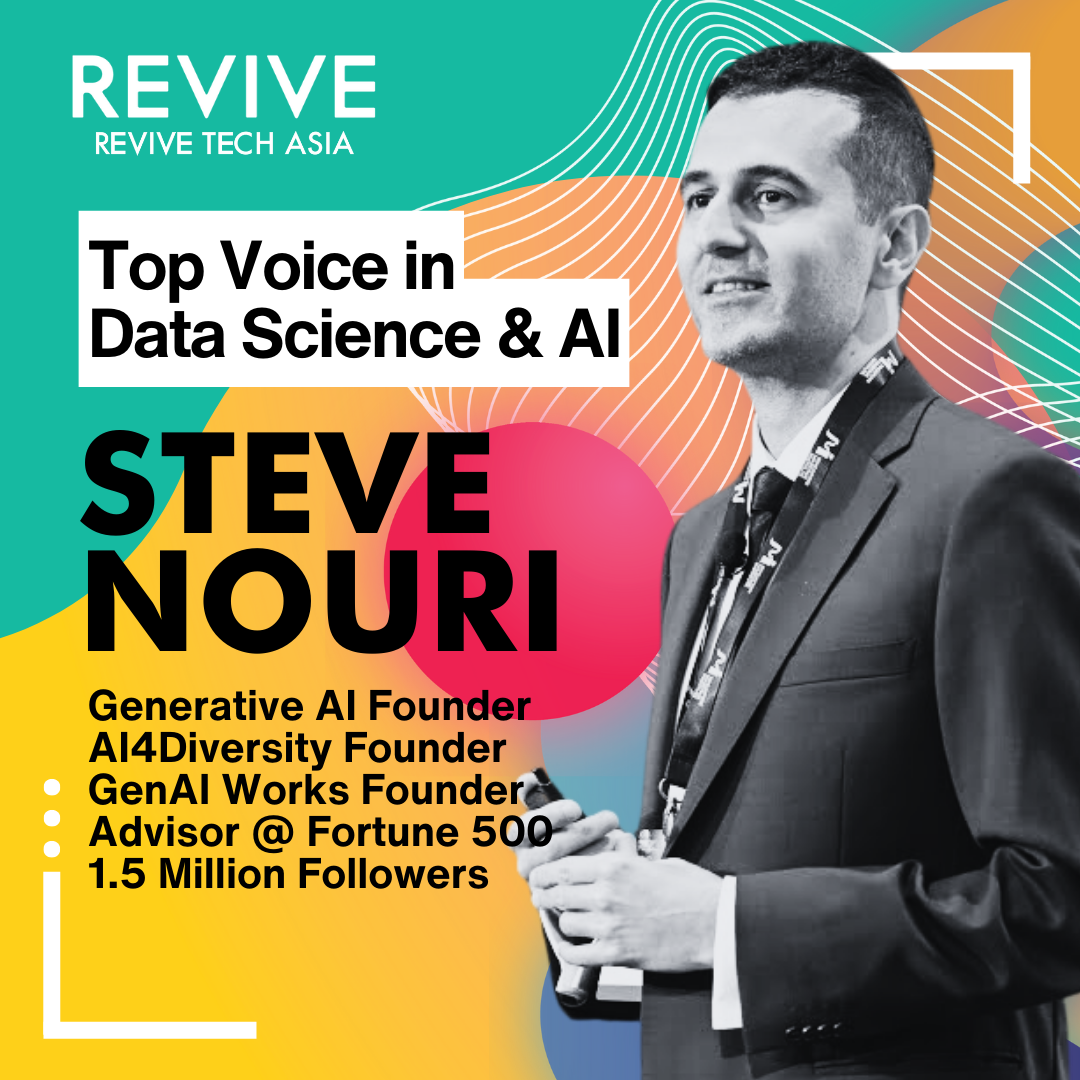For decades, managing data essentially meant collecting and storing it. That has all changed. Businesses are now looking for critical information and insights that can be extracted from the massive amounts of data, to drive better business decisions that unlock efficiency and feature gains. This track is curated in a way that would inspire you to build a sector-specific modern data environment with proven data strategies that address infrastructure complexity and integration, help you make sense of that data through analytics, AI, automation and ML engineering and ultimately – deliver outsized business value and transform lives.
- Data Architecture – Data Fabric, Data Mesh and Data Muddle
- Data Governance / Compliance & Data Ethics
- Data Modelling Challenges
- Data Quality
- Business Analytics – AI-driven data analytics
- Metadata Management
- Data Literacy
- AI for business
- More
Highlighted Session: Generative AI: The Future of AI Business
This upcoming session will explore the transformative potential of Generative AI in business. We'll provide an overview of generative AI, discuss its impact on industries such as entertainment, manufacturing, healthcare, and marketing, and highlight its role in streamlining processes, enhancing creativity, and personalizing experiences. We will also address the ethical challenges posed by generative AI, emphasizing the need for robust regulatory frameworks. The session will conclude with strategies for leveraging generative AI for competitive advantage, underlining its essential role in future innovation.
Speaker: Steve Nouri, Founder and Board Member, Generative AI

 |
The Future of AI Debate: Should We Hit Pause or Fast Forward?
Join leading experts in a captivating debate on the future of AI. Should we hit the pause button or fast forward its development? Explore contrasting perspectives, ethical dilemmas, and potential consequences. Engage in thought-provoking discussions and gain valuable insights into shaping AI responsibly. Don't miss this opportunity to be part of the landmark debate on "The Future of AI: Hit Pause or Fast Forward?"
Speaker:
- Deacon Wan, Senior Director Analyst, Key Initiative Leader, Gartner
- Edmund Lee, Co-President, Hong Kong Innovation and Technology Cooperation Association
- Claude Achcar, Founder & Managing Partner, Actel Consulting
- Crystal Fok, Head of STP Platform, Hong Kong Science and Technology Parks Corporation
- Pradip Madhanagopal, Partner, PwC Hong Kong
- Prof. Richard Xu, Professor, Department of Computer Science, Hong Kong Baptist University
- Dr Ashley Fernandez, Chief Data & AI Officer, Huawei Singapore

Our Speakers
Join leading experts in a captivating debate on the future of AI. Should we hit the pause button or fast forward its development? Explore contrasting perspectives, ethical dilemmas, and potential consequences. Engage in thought-provoking discussions and gain valuable insights into shaping AI responsibly. Don't miss this opportunity to be part of the landmark debate on "The Future of AI: Hit Pause or Fast Forward?" In the age of Generative Artificial Intelligence (Gen AI), we're witnessing a digital revolution that's not just impressive but downright transformative. But wait, it's not all buzzwords and futuristic concepts. It's about understanding how Gen AI can become your trusty sidekick in the world of marketing and sales. Join us for an interactive panel where we'll have a chat with industry experts who'll walk us through the real-world of Gen AI. They'll show you how Gen AI is more than just a time-saver; it's an innovation booster and an efficiency enhancer. We're talking about a game-changer that can streamline your operations, dazzle your customers, and even whip up marketing magic. Do expert practical tips and real-life use cases. Generative AI can be used at many interesting scenarios in our personal life and business, yet there can be a number of considerations and hurdles to overcome when it is adopted at real business. This section will share how generative AI can be adopted quickly, safely and effectively in practice for the retail industry. Artificial General Intelligence (AGI) is poised to revolutionize industries and reshape the future of technology. In this engaging session, Nixon will introduce the cutting-edge AGI products of SenseTime and delve into the transformative potential of AIG as well as its profound impact on various sectors. Join this session as Man Yu, Technical Manager of CloudMile will delve into the world of Generative AI and its transformative impact on businesses. Discover how the cutting-edge Google Palm2 model is reshaping the way we think about business potential. Witness a live demonstration showcasing the creation of a Generative AI chatbot that can engage customers and provide personalized experiences. Explore the diverse use cases of Generative AI, from virtual assistants to automated content generation, and learn how it can enhance efficiency and drive sales revenue. (This session will be conducted in Cantonese.) Nowadays the complexity of IT landscape and 3rd party integration expose any company to data leakage, ransomware and compliance challenges. How do you prepare and prevent your company by setting an ad hoc strategy and align on what matters the most for your business. This upcoming session will explore the transformative potential of Generative AI in business. We'll provide an overview of generative AI, discuss its impact on industries such as entertainment, manufacturing, healthcare, and marketing, and highlight its role in streamlining processes, enhancing creativity, and personalizing experiences. We will also address the ethical challenges posed by generative AI, emphasizing the need for robust regulatory frameworks. The session will conclude with strategies for leveraging generative AI for competitive advantage, underlining its essential role in future innovation. Get ready to take a deep dive into the dynamic relationship between people, emerging technology, and practical innovation, exploring how these elements intertwine to drive ground-breaking advancements that shape the future. In this session, SL Ho, Head of Digital Innovation at Cathay, will discuss the importance of fostering a culture of creativity in driving innovation across an organisation and the role strategic partners play in helping companies accelerate in digital transformation. He will also share Cathay’s very own success stories of ideas from inception to productivity, providing insights into how we effectively bridge the gap between current and future needs and how our idea aligns with market demands and drive tangible outcomes. The rapid growth of e-commerce, fueled by advancements in artificial intelligence (AI), is transforming the retail landscape, impacting various aspects of the industry. AI is revolutionizing personalization and customer experience through tailored product recommendations and improved customer service. AI plays a crucial role in payment processing, pricing strategies, visual search, social media marketing, sentiment analysis, and content generation. That’s how shopping apps such as Shein and Temu jumped from zero users to capturing half of Amazon’s user base in one year. And now Tik Tok Shop is transforming shopping via livestreaming. What did they do right? How are they different from a traditional ecommerce app? Using Sharon’s decade long experience in ecommerce, this session will uncover the secrets of how certain shopping apps were able to use AI to quickly capture market share. By understanding these AI-driven developments, senior executives in large retail and e-commerce businesses can prepare their organizations to thrive and remain competitive in an increasingly AI-driven retail landscape. In the last couple of years everybody was talking about generating value from data and anything without data involved will not fly. Data teams and their leaders became the cheerleaders and we're trying to convince the business of the great future. It never really worked (unless you work for one of those large magical companies). Along came data mesh and you thought it was the solution to all your problems; you started preaching it. Companies and their sales people started incorporating the new buzzwords into their products promising data Nirvana. All with the same result. But what can really make a difference? This talk is about hard work (speaking with other people and trying to understand their problems), persistence (not giving up if somebody is in a bad mood the first time you meet them) and that sometimes it helps to have some distance. Daniel provides a radical new framework for thinking about AI, and discusses how organisations can practically adopt these technologies and avoid being seduced by the hype. He argues that whilst these technologies are incredible at creating growth and streamlining operations, for companies to stay innovative they need to also use AI to unlock the creative capacity of their workforce. Daniel also covers the macro impact these technologies may have over the coming decades. Modern IT infrastructures are key to digital transformation overhauls. They’re necessary to power the data-hungry apps and tools that embody transformation, but they’re also huge when it comes to human experience—the ultimate driver behind digital transformation. IT has a unique opportunity to be a trailblazer in efficiency and sustainability. In this session, learn how modern data infrastructures can phase out old headaches, inefficiencies, allowing IT teams to do less low-level work, get creative time back, and focus more on what matters. Dive into the future of business transformation with Generative AI! The session will provide insights into the differences between GenAI and traditional AI, emphasizing the former's ability to synthesize new content from existing data. The discussion will include six use cases of GenAI in data analytics, data intelligence, change management, campaign taxonomy, product feed improvement and content production, all of which are designed to effectively enhance your decision-making and drive business growth. Additionally, it will offer a comprehensive roadmap for GenAI implementation, from identifying business needs to scaling the model for production. This engaging session will serve as an invaluable resource for comprehending the transformative role of GenAI in business and effectively managing its implementation challenges. In this session, Ted Suh will explore the possibility and potential of a new AI language model, DarkBERT that has been specially trained on the dark web where cryptocurrency is being used for money laundering and digital payments in the underground market. This session will also cover how DarkBERT can be used to combat in the cybercriminal environment. In today's business landscape, the term ""AI"" is frequently thrown around like confetti at a celebration. Every company claims to harness its power, but does that guarantee success? To truly excel in the AI game, you need more than buzzwords. Our panel of AI experts will demystify the path to AI success. Learn the essential keys to adopting AI, managing AI projects, and discover practical ways to deploy AI responsibly and ethically in your business. While AI offers exciting opportunities, it's not without its risks. Its agile nature can pose challenges. How can businesses establish governance frameworks to ensure that AI enhances, rather than disrupts, operations and integrity? And what's the government's role in this AI-driven landscape, especially in Hong Kong and Mainland China? Get ready to unlock the potential and navigate the pitfalls of the AI revolution. Leading with research-based insights from Asana’s Work Innovation Lab, join Lizzie Harrington, Channel Partner Manager for Northeast Asia at Asana - to understand how you can navigate the future of work with Artificial Intelligence. In the world of work today, AI is revolutionizing the way we work and has the potential to drive enormous productivity gains. In this session, we will explore how teams can leverage on AI to make smart decisions and hit goals faster by focusing on what matters. How do we drive data culture across our group and companies ? Should we adopt the "wait and see" approach to observe how other companies are harnessing the power of GenAI? Many forward-thinking companies, including tech giants, industry leaders and ambitious startups, have embarked on experiments with GenAI to tackle formidable challenges and capitalize on business opportunities. How did they embark on their GenAI journeys? What valuable lessons did they glean from their experiences? Join us in this panel discussion as we delve into the strategies and practices of these GenAI trailblazers, exploring their innovative approaches and insights. • Digitalization and AI are revolutionizing bancassurance, enabling personalized services, improving risk assessment and fraud detection Recent machine learning techniques such as deep learning and reinforcement learning were built on specific assumptions of the underlying data generation process. Financial time series frequently do not satisfy these assumptions. In this talk, we discuss the possible problems if these techniques are applied blindly. The solutions to these problems are in general problem specific. However, some fo the pain can be alleviated by combining recent machine learning techniques with more classical statistical and econometrics insights. We will discuss these probably solutions with examples. The utilization of Artificial Intelligence (AI) in the insurance sector has been expanding rapidly, presenting numerous opportunities for improved efficiency, accuracy, and decision-making. However, as AI becomes increasingly ubiquitous, it is essential to ensure that its deployment is ethical, transparent, and accountable. This presentation will delve into the principles and practices of Responsible AI in the financial services, encompassing aspects such as data diversity and inclusivity, algorithmic explainability, and human oversight. We will also examine the potential consequences of AI bias and discuss methods for mitigating its impact. By adopting a responsible approach to AI, the industry not only will enhance their business operations but also foster trust and confidence in their decision-making processes. Join us to discover how your organization can harness the power of AI in a way that benefits both your business and society at large. Join this session where Isabella Ma, Account Manager of CloudMile, delves into the power of cloud technology in driving digital transformation initiatives. Discover how cloud technology serves as the backbone of digital transformation, providing scalability, flexibility, and cost-efficiency. Isabella will share real-world use cases and success stories, showcasing the transformative impact of cloud technology. In the second part of the session, we have invited Kelly Chan, Co-Founder & CEO of AITable.ai, to take the stage and unveil the capabilities of AITable.ai in empowering organizations to harness the potential of AI. Utilizing AI as the backbone of the solution, Kelly will showcase how this innovative solution turns tables into powerful AI agents with just one click, simplifying the process without the need for extensive coding or document uploads. Don't miss this opportunity to explore the possibilities of AI technology and discover how AITable.ai can revolutionize your organization's digital transformation journey. In the era of Gen AI, businesses are at a crossroads. How can you harness its transformative power while avoiding the pitfalls that may jeopardize your success? If you're still skeptical about its potential and worried about the possible hazards that Gen AI holds for your business, this panel is your compass. Join us as we embark on a journey to decode Gen AI's mysteries. This discussion will guide you through the intricate landscape of Gen AI, helping you distinguish between its game-changing capabilities and the potential risks it poses to businesses. By the time you leave this panel, you'll have a tangible list of actionable dos and don'ts that you can confidently carry with you, ready to infuse Gen AI's power into your business strategy. Altar RapidMiner is an end-to-end data analytics platform that replaces legacy systems while supporting the latest in modern technology and deployment. Altair RapidMiner runs SAS Language programs, R, Python and SQL or be operated using an intuitive workflow interface. In this presentation, Dr. Shidan Murphy will showcase how Altair has helped an organization seamlessly migrate and run thousands of SAS Language programs in Altair RapidMiner. Dive into the world of frictionless AI, where data science becomes a breeze for both data science novices and experts. - The role of data analytics and AI in revolutionizing insurance processes. Programme
What are the key challenges and how did we overcome them ?
• Tailoring insurance products for customers with Embedded Insurance
• Rise of Innovative Business Models such as pay-per-use, peer-to-peer, and usage-based insurance
• Disruption in Product Offerings and Risk Management
• Navigating the Complex Regulatory Environment of insurance and banking
- Real life examples of insurers leverage data analytics and AI for enhanced decision-making and improve customer experience
- Predictions on emerging technologies and trends that will shape the insurance industry
- Opportunities and challenges that insurers and insurtech companies can anticipate in the coming years.
- Exploring successful collaborations and partnerships driving innovation and growth in the insurance industry
Take the spotlight and Share your story
Revive Tech Asia offers a unique opportunity to spread good ideas that stimulate multi-faceted dialogue and inspire others to action. It doesn’t matter where you are from – established enterprises or fast-growing start-ups; If you think you might be a good speaker for Revive Tech Asia, or you know someone who would make a great speaker, let us know! We are always happy to hear from potential speakers with an exciting story to share.We are committed to protecting your privacy. We will never collect information about you without your explicit consent.
Register Your Interest
Register your interest and we will make sure you receive the latest information about the industry, our events and exclusive offers!
We are committed to protecting your privacy. We will never collect information about you without your explicit consent.
Become a Partner / an Exhibitor
Team up with Revive Tech Asia! Let us know how you would like to take part – our team will come back to you shortly with personalised solutions.We are committed to protecting your privacy. We will never collect information about you without your explicit consent.
We are committed to protecting your privacy. We will never collect information about you without your explicit consent.
Join 10,000+ others to become a tech insider. And YES – it’s completely free.
Sure thing! You may find out more about RTA in our brochure. Contact us anytime if you want any additional information.
We are committed to protecting your privacy. We will never collect information about you without your explicit consent.
Peggy Lau is a seasoned consultant in process reengineering, digital transformation and AI application for business. She received her PhD degree in industrial optimization and BEng degree from the University of Hong Kong. She worked at the HKSAR government on information technology policy, a top-tier airline on flight network planning, and partnered with clients at various industries on process reengineering and AI system design. She now heads the AI Lab of Chow Sang Sang Jewellery Co Ltd which is a well-known retail group in the Greater China Region. She leads digital transformation projects and AI/ data science applications development at different areas, from demand planning and supply chain management to customer and store analytics. Prior to this role, she managed the supply chain system team on logistics and procurement operation redesign, as well as inventory management and control. One of her projects also received the ICT Award in the smart logistics sector in 2020. She is also registered with Scrum Product Owner, Six Sigma Black Belt (SSBB), Project Management Professional (PMP) and Certified Analytics Professional (CAP) qualification.
Jerry Yuen, Solutions Architect, Google Cloud
Michelle is a global digital leader with 25+ years of experience, empowering MNCs to unlock their full potential and maximize profitability through digitalization. At Accenture, she is focused on Digital Marketing and Commerce solutions, from next generation marketing, new Commerce channels, Social commerce and AI enabled SynOps technology to increase online monetization and operations efficiencies.
Prashant Kumar is a leading marketing futurist and a digital marketing maven in Asia-Pacific. He founded ENTROPIA – a next gen marketing services company in 2016 (now a part of Accenture). Within four years, it became the largest independent in SE Asia. In 2020, Entropia was recognized as the third fastest growing large agency in the world by AdWeek, New York. Entropia has been a pioneer of Marketing in the Industry 4.0 era. In 2021, Entropia was acquired by Accenture in their largest acquisition in the region. Before Entropia, Prashant was the President of IPG Mediabrands Asia (NYSE: IPG), overseeing $3.8 billion in billings across clients such as J&J, Coca-Cola, Exxon, Sony, Microsoft, KFC et al. He turned the region into the fastest growing in the network on the back of a slew of futuristic offerings. Prashant has served on the prestigious Cannes Lions jury as one of the youngest, apart from being a Jury member at Crystal festival, France and Dubai Lynx Awards among several others. He has been a speaker at leading global industry events such as Digital Marketing Expo, Cologne and Festival of Media Global, Rome apart from a series of Asia-Pacific and local conferences. He has also been interviewed by Wall Street Journal and Bloomberg for his digital leadership apart from making the cover story in the industry press half a dozen times. He has been a marketing mentor with the non-profit, Endeavor global mentoring dozens of successful eCommerce scale-ups for the next level of growth. He is a charter member of TiE Singapore and Singapore Institute of Directors. In 2019, International Advertising Association (IAA) recognized him as one of the five digital thought leaders around the world. His book – Made in Future – published by Penguin and launched in May ’22, became a bestseller on Amazon India for several months, also covered and recommended by leading media cos. such as CNBC, Economic Times, Outlook, Asian Age and Financial Express. He is an alumnus of prestigious St. Stephen’s College, Delhi; MICA Ahmedabad & Harvard Business School. He is also a budding aviator and a father of two boys.
Maxime has over 25 years sales and business development experience in the IT & Telecommunications industries, helping clients manage the complexity of infrastructure transformation and enable them to deliver tangible outcomes for their businesses.
Digital and experience devotee working in luxury, retail and travel retail, bank and digital industry for over 20 years. Leading and supporting digital transformation since 2012, I’m a technology leader passionate and driven by user experience. True jack of all trades, my digital journey and experience passed through online streaming, EDM, CMS, digital panels, e-commerce, online payment, UX / participatory design and Wechat ecosystem. I worked in various business areas and I’m still eager to discover new digital experience with new type of users in different part of the globe. Lately, I got my interest on decentralized business application layers and authenticity (ID, products, Art…) through digital technologies.
With over 10 years of experience in IT infrastructure, cybersecurity, and cloud engineering, Man is a technical leader skilled at securing IT environments and uplifting legacy architectures. His expertise spans IT security, network infrastructure and cloud migrations. He has served as a technical consultant architecting secure hybrid and cloud infrastructures tailored to clients' profiles. Man thrives on collaborating with clients and helping organizations optimize their IT ecosystem, harden defenses, enable digital transformation securely, and support their cyber resilience journey.
Kelly Peilin Chan is the Co-Founder and CEO of Vika Inc. and AITable. Vika, inc. has successfully raised over US$10M+ in funding from prominent investors such as HillHouse Capital, IDG Capital, 5Y Capital, and Eminence Capital. Prior to his current roles, he held the position of CTO and board member at HEYTEA, the leading new milky tea company in China. With a background as a Senior Engineer and Software Architect at Kingsoft Software, Kelly brings extensive industry experience to his leadership positions.
Isabella Ma, Account Manager, CloudMile Limited
Dr. Shidan Murphy heads the solutions team of Data Analytics for Altair in the Asia-Pacific region. Dr. Murphy brings to Altair a rich and varied experience in data science. Beginning his career as a Research Scientist with the Canada Government, Dr. Murphy developed numerical methods to predict how climate change, shipping patterns and shoreline modifications affect fish communities in the Great Lakes of North America and in the Canadian Arctic. Today, Dr. Murphy empowers financial institutions, retailers, utilities, insurance and consumer-packaged good companies across Asia, India and Australia with data-driven decision making. Dr. Murphy is an award-winning scientist, and author of several papers published in international journals and written software to teach statistical computing in R. He holds a PhD from the University of Toronto.
Pradip is a Partner at PwC, Hong Kong and leads the Regtech Practice. He specialises in Regtech, Generative AI and financial crime compliance transformation and has in-depth expertise and practical experience helping his clients across the following areas: •Building end-to-end Regtech solutions that; reduce false positive alert generation, improve true alert conversion rates, risk prioritise alerts and bulk close low risk alerts, optimise parameters/thresholds and customer segmentation tiers and enhance fuzzy matching logic. •Designing and implementing Generative AI solutions that challenge conventional ways of working and address specific pain points across front-to-back office functions to ensure tangible and quantifiable benefits are realised. •Conducting financial crime compliance transformation projects that redesign operating models, improve customer experience and enhance compliance with regulatory obligations, through the use of advanced analytics, machine learning, intelligent automation and natural language processing. •Enhancing compliance and anti-money laundering/counter-terrorist financing ("AML/CTF") systems, governance frameworks and controls in place. •Designing cost optimisation strategies that result in sustainable cost reduction and process efficiencies, to reflect new ways of working and changing customer expectations.
Melissa is the Head of Business Product Marketing for Greater China Region at Meta. She has been with Meta for more than four years and leads go-to-market and feedback for monetization, including direct response, brand, commerce, video, Facebook, Instagram, Messenger, WhatsApp, and business integrity products. Prior to that, she was with Yahoo for 10 years, where she oversaw Asia Pacific product marketing accountabilities and program management aspects for online display advertising platforms (demand and supply sides), order-to-cash systems and programmatic advertising.
Andre Kwok is currently the Chief of Staff of the global family office Tsangs Group, as well as the Executive Director of Hong Kong Ambassadors Club. In 2016, Andre Kwok founded the Good City Foundation as Chairman and participated in various technology innovation industries through venture building and venture capital. The Foundation has been dedicated in domains such as Public Private Partnership, Urban Innovation and Impact Investing in verticals such as financial inclusion, future of work, food and smart city governance, through initiatives such as “Future City Summit”, public policy research and development programs. Andre is currently also the Fellow in the World Economic Forum for global urban transformation and Director in the HK Social Entrepreneurship Forum. Andre is also the Executive Director for the Hong Kong Ambassadors Club, a public-private initiative founded by the global family office Tsangs Group and The Hon. Jeffrey Lam, Member of the HKSAR Government Executive Council and Legislative Council. In 2023, Andre was also appointed by the HKSAR Government to be the District Youth Development and Civic Education Committee and invited by the HKSAR Government’s Chief Executive's Policy Unit as Co-Investigator in the Public Policy Research Scheme. While Andre was named Li Ka Shing Foundation Scholar for Masters in Public Policy in the Lee Kuan Yew School of Public Policy and graduated as Bachelor of Social Sciences (Politics and Public Administration) in The University of Hong Kong, he also joined as Student Fellow in the Centre for Liveable Cities in the Ministry of National Development of Singapore. Andre is listed in the Tatler Asia's Gen.T List 2022 and the Forbes China 30 Under 30 as Social Entrepreneur.
Chak Wong is a Managing Director within J.P. Morgan’s Machine Learning Center of Excellence, responsible for the Time Series and Reinforcement Learning group. He is also Professor of Science Practice in the Mathematics department of Hong Kong University of Science and Technology. Prior to JP Morgan, Chak worked in Goldman Sachs’ trading rate and FX division as well as at Morgan Stanley in the credit and EM group in London. He also ran UBS’ non-vanilla trading for Asia, IBD structuring for Barclays Asia, FI and Sovereign Sales for Société Générale. Previously he served as a full-time professor at the Chinese University of Hong Kong (CUHK). Chak earned a PhD in Economics from Oxford.
Dr. Tsougenis is a highly experienced full-stack A.I. specialist with over a decade of experience in the field. He has held various positions ranging from machine learning and product development to management and governance. His diverse background allows him to effectively bridge the gap between A.I. engineers, C-level executives, and academics, while promoting innovation and embracing agile transformation. Following the completion of his PhD in 2013, he has been involved in numerous AI projects across several domains, including financial services, healthcare, and smart city. Additionally, he has published several deep learning articles in top conferences and journals, and currently serves as an Honorary Lecturer for HKU.
Jin-Woo Chung is a dedicated specialist with expertise in natural language processing and artificial intelligence. He currently holds the position of Head of AI at S2W's Core Tech Center. Having earned both a PhD and MS from the Korea Advanced Institute of Science and Technology (KAIST), his research is primarily centered around the adaptation of AI and NLP techniques for domain-specific applications, including areas such as the dark web, cybersecurity, scientific literature, and daily conversation. His particular research interests encompass language models, question answering, text mining, and information extraction. Previously, he served as a staff researcher at the AI & SW Research Center of Samsung Advanced Institute of Technology. His recent accomplishments include the publication of papers at prestigious AI and NLP conferences, notably ACL and NAACL, covering subjects like domain-specific language models and document classification. Noteworthy among his achievements is the impactful work on the dark web language model ""DarkBERT,"" which has gained international recognition and has been featured in esteemed media outlets such as Forbes, Tom's Hardware, Help Net Security, Interesting Engineering, and ITmedia.
Group Head of Data under New World Group - An experienced data management and technology leader with in-depth delivery and corporate exposures in data governance, architecture & engineering across 4 major industries - Telecom, Banking, Insurance and Property for over 11 countries in Asia Pacific (including China, HK, Japan and SEA)
Robert (Rob) Speers is a partner in Heidrick & Struggles’ Hong Kong office and co-lead of the global Insurance Practice. He provides executive search and leadership consulting services to his clients. Rob has more than 25 years of experience in Asia across various disciplines and markets within the financial services industry. Before Heidrick & Struggles, he was in a senior regional role in the insurance consulting and technology practice of Willis Towers Watson based in Hong Kong, where he was responsible for business development and key deliveries. While at Willis Towers Watson, Rob led an advisory project for a large retail bank, securing one of the most profitable life insurance distribution agreements in that market, and advised many insurance companies on distribution channel optimization and numerous buy and sell-side M&A transactions. He worked extensively with insurers on corporate strategy initiatives and developed a high volume of market research reports. Previously, Rob held senior management roles in strategy and distribution, assisting in MetLife’s Southeast Asia market entries, and was the first chief distribution officer of MetLife’s Vietnam joint venture. Before that, he held senior business development roles with American Express in Singapore. Education Aalto University, Executive MBA University of Waterloo, Bachelor’s Degree, Applied Human Sciences
Ted Suh is a co-founding member of S2W and initially joined as a darkweb intelligence analyst, leveraging his expertise to uncover insights within the clandestine corners of the internet. He has now transitioned into the role of Director of Business Center, responsible for navigating long term growth strategy. He is a respected speaker in the field of darkweb intelligence and cybersecurity. He has been invited to share his knowledge at various conferences, including Chainalysis Trace DC 2023, where he delivered DarkBERT: an AI model for combating cybercrimes at Washington DC, US. Ted also spoke at NetSec-KR 2021, shedding light on the analysis of the cybercriminal ecosystem within the deep and darkweb. Furthermore, he addressed the audience at K-CTI 2021, exploring the potential for security enhancement through darkweb intelligence. In 2020, Ted shared his insights on tracking and analyzing cyber crimes on the darkweb at FISCON. Ted holds a BS degree from the University College London (UCL) in the UK, then pursued his academic journey at the Korea Advanced Institute of Science and Technology (KAIST) in Korea, obtaining a master's degree in information security.
Wilson heads PwC’s global technology, media and telecommunications (TMT) industry practice. He is also the TMT industry leader for the firm’s Mainland China and Hong Kong practice. Wilson is based in PwC China’s Shenzhen office. Emerging technologies and digital deployment are redefining all industries and businesses. They also lead to rapid growth and developments of companies in the TMT industry. Wilson has been leading and supporting the PwC global network across all lines of service - Assurance, Taxation and Advisory - to provide one-stop professional solutions and services to companies in the TMT industry, as well as to clients looking for reinventing themselves through digital transformations. Wilson has been working in the public accounting practice in Mainland China and Hong Kong for more than 30 years. He has extensive experience in providing assurance and advisory services to companies in the TMT industry, ranging from start-ups to global tech giants, for capital market transactions, assurance engagements, systems and controls advisory, and deals. He is a practising member of the Hong Kong Institute of Certified Accountants, China Institute of Certified Public Accountants, and the Association of Chartered Certified Accountants. Wilson is also an adviser to the Internet Advertising Board of Hong Kong.
Dr. Charm has amassed over three decades of experience in the innovation and technology industry. He previously served as the Chief Public Mission Officer of Cyberport and held senior executive positions at leading multinational, Chinese, and Hong Kong enterprises such as IBM, Oracle, HSBC, Jardine Pacific, and Kingdee. Dr. Charm specializes in digital strategy and transformation, corporate innovation, intrapreneurship, and start-up cultivation. He possesses technical expertise in areas such as big data, AI, fintech, blockchain, and e-commerce. Currently, Dr. Charm holds the position of Chairman and Principal Advisor at several elite Asia-based start-ups, including OpenCertHub Academy, Wizpresso, Buyandship, Posify, HairCoSys, and more. He provides digital transformation and data monetization advisory services to leading enterprises such as Transunion, HSBC, foodpanda, Hong Kong Airport Authority. Dr. Charm is an associate director and professor (EMBA) at the Chinese University of Hong Kong. He has designed and delivered executive courses to influential enterprises in Asia such as Chow Tai Fook, Harbour City, AIA, Bank of East Asia, ICBC, CCB. Dr. Charm’s Engagement in the Innovation and Technology Ecosystem Dr. Charm has been an active contributor to the innovation and technology ecosystem in Hong Kong, the Greater Bay Area, and ASEAN. In 2022, he founded the Data Literacy Association. Since 2019, he has been the Chief Judge of HKICT Awards (FinTech) and, since 2022, Chair Judge of Business GoVirtual Tech Awards (Digital Transformation). Dr. Charm is also an advisor to several influential organizations, including HKSTP, Cyberport, GS1 HK, ASTRI, HKPC, Hong Kong Institute of Bankers (FinTech), Federation of Hong Kong Industries (Startup Council), CityU (Tech 300), and Hong Kong Consumer Council (Digital Economy Committee). In 2020, Dr. Charm published his book ""Digital Power-Up《數碼力大提升》"" and, in 2021, his international business case ""HSBC – Embracing Open Innovation for SMEs"" on Ivey Publishing. He received the School of Business Distinguished Alumni Award (2019) and Outstanding Doctor of Business Administration Alumni Award (2018) from the City University of Hong Kong. Dr. Charm has completed senior leadership and digital transformation training from several prestigious institutions, including MIT, Harvard, UC-Berkeley, Oxford, and CEIBS. For more information about Dr. Charm, please visit his LinkedIn profile at https://www.linkedin.com/in/toacharm/.
Global Senior Executive with 25 years’ (re)insurance experience with 14 years’ holding chief underwriting operating officer positions within top-class organisations, deploying underwriting, operational and reinsurance propositions, establishing strategic partnerships and managing risk. Recognised (Ultra) HNW UW specialist, proven global digital acceleration leader, recently relocated from Bermuda based in Asia and underwriting global HNW business, as well as traditional Life and Health. International experience covers the Americas, UK & Ireland, Europe, South Africa, Middle East and Asia Pacific.
As a Data Analytics Business Development Lead at Amazon Web Services, I bring over 15 years of experience in the technology industry, where I have had the privilege of contributing to enterprise digital transformation projects across diverse industries. My impressive knowledge of Data Analytics, Artificial Intelligence & Machine Learning has enabled me to execute data strategies for numerous enterprises, resulting in exceptional outcomes. I am highly motivated to share Amazon's data strategy with others, empowering them with the knowledge and tools to effectively leverage data. In my role, I am dedicated to creating new opportunities for collaboration and innovation, while remaining committed to promoting data literacy within Hong Kong society.
Andrew Otremba is the head of the Hong Kong office at fifty-five with years of experience in data strategy, data analysis and project management. He helps clients with efficient and future-proof digital strategies allowing them to achieve impactful outcomes. Andrew graduates from the University of Nottingham, with a strong background in engineering and business consultation. He has previously held a business development & project manager role at iClick interactive before joining fifty-five.
Andrew Chan is an experienced head of data with expertise in digital transformation and data visualization across various industries. He has a proven track record of leading successful data-driven initiatives and developing effective data strategies. In addition to his work in industry, Andrew is a respected academic, lecturing at Hong Kong Baptist University. He is also a founding member of the Data Literacy Association (DaLa), which aims to promote data literacy and enhance data-driven decision-making across industries.
Ms Carol Lee is Vice President - Membership & SheLeadsTech of ISACA China Hong Kong Chapter. She was awarded 2021 Global 100 CEH (Certified Ethical Hacker) Hall of Fame, the 2016 Hong Kong Cyber Security Professionals Awards and 2023 Women in IT Asia Award in recognition of her determination and commitment in assuring the security of the cyberworld. Other than the above community service volunteer role, she is the Head of Cyber Security & Risk Management of Hang Lung Properties Limited. She has substantial experience in leading enterprise-wide security programme to support cloud and digital transformation strategy, specialised in adopting proven change management methodology in the security & privacy management program. She has more than 25 years of working experience serving retails, insurance, supply chain, public utilities, manufacturing, property development, and consultancy industries. Carol holds several information security and privacy designations, including C|CISO, CIPM, CDPSE, CISM, CRISC, CCSP, CSSLP, and CEH. She is also a Certified Change Management Practitioner.
Claude Achcar is the Founder and Managing Partner of Actel Consulting, a specialist Tech advisory firm. The company, founded in 2002, differentiates through independent, deep-dive, and hands-on guidance to deliver implementable advisory. Clients include investors, innovators, corporates, telecoms, service providers, and regulators. Claude has over 30 years of ICT experience. He began his career as an AI Research Associate followed by eleven years in various engineering, marketing, and operations roles with Nortel. Prior to Actel Consulting, Claude was Managing Director and VP Asia at Ciena. Claude is an engineer by training, holding B.Eng. & M.Eng. (Speech Recognition) degrees from Ecole Polytechnique, and an MBA from McGill University, both in Montreal, Canada.
Dr Crystal Fok is currently the Head of STP Platform at Hong Kong Science and Technology Parks Corporation (HKSTP). She is mainly responsible for various Innovation and Technology related initiatives in Science Park to drive technology adoption in industries, especially in Real Estate, Logistics, Banking & Finance and Healthcare sectors. Prior to HKSTP, Dr Fok was a Manager at ASTRI, managing a diverse project portfolio, such as market analysis, feasibility studies, product development and technology commercialization. She was also a Consultant at the Hong Kong Productivity Council, managing the optical design team and providing consultancy service on precision manufacturing. Dr Fok received her PhD degree in Mechanical and Automation Engineering from the CUHK and her research interests include A.I., Robotics, MEMs and micro-optics. 霍露明博士現為香港科技園公司STP Platform總監。專責香港科技園內有關於創新科技的新方案,旨在推動各行業的科技應用,特別是在建築、物流、金融和醫療行業等領域。 加盟香港科技園公司前,霍博士曾擔任香港應用科技研究院經理,主責進行市場分析、可行性研究、產品開發和技術商品化的多元化專案組合。她亦曾擔任香港生產力促進局的顧問,管理光學設計團隊,為精密製造的行業提供諮詢服務。 霍博士於香港中文大學取得機械與自動化工程學博士學位,研究領域涵蓋人工智能、機器人技術、微機電和微光學。
Daniel Hulme (PhD) is a globally recognised expert in Artificial Intelligence (AI) and investor in Emerging Technologies. He's the CEO of Satalia, an award-winning company that provides AI products and solutions for global companies such as Tesco and PwC. Satalia exited to the world's largest marketing company in 2021, WPP, where Daniel is now the Chief AI Officer; helping define, identify, curate and promote AI capability and new opportunities for the benefit of the wider group and society. He is co-Founder of Faculty AI as well as advisor to responsible AI and AI assurance startups such as Holistic AI. Daniel has over 20 years academic experience with AI. Having received a Masters and Doctorate in AI at UCL, Daniel was previously Director of UCL’s Applied AI MSc (Business Analytics), where he is now UCL’s Computer Science Entrepreneur-in-Residence and a lecturer at LSE's Marshall Institute, focused on using AI to solve business and social problems. Daniel is also an Impact Board Member of St Andrew’s University Computer Science department. Passionate about how technology can be used to govern organisations and bring positive social impact, Daniel is a popular keynote speaker specialising in the topics of AI, ethics, metaverse, emerging technology, innovation, decentralization and organisational design. He is a serial speaker for Google and TEDx, holds an international Kauffman Global Entrepreneur Scholarship, and is a faculty member of Singularity University. Daniel is a contributor to numerous books, podcasts and articles on AI and the future of work. His mission is to create a world where everyone has the freedom to spawn and contribute to innovations, and have those innovations become free to everyone. He has advisory and executive positions across companies and governments, and actively promotes purposeful entrepreneurship and technology innovation across the globe.
Since 2008, Eden has been a pioneer in social media listening and analysis, unveiling market trends and consumer insights with precision. Recognised as a leading authority in social media metrics, analytics, and insights, he thrives in entrepreneurial environments, consistently spearheading innovative products and services, and identifying untapped market opportunities. Under Eden's visionary leadership, his team has seen impressive growth and expansion. Renowned as a thought leader in burgeoning communication strategies within Asia, Eden frequently imparts his expertise through high-profile speaking engagements and prestigious consultancy roles. Eden's academic achievements include an MBA from the Hong Kong University of Science and Technology and the completion of an International Executive Development Program at INSEAD, France. In his capacity as a public speaker and consultant to premier clients, Eden provides invaluable insights and fosters a dynamic exchange of ideas on market trends and strategies. This engagement empowers clients to unlock the full potential of social media insights. He also enriches the academic landscape as a lecturer in data science at the esteemed Chinese University of Hong Kong.
Ian Lee is the General Manager of the Asia Fintech Center and the Regional Head of Commercial for ZA Tech Global based out of Singapore. He joined ZhongAn Technologies International Group 5 years ago as Strategy Director and founding team member supporting ZA Group affiliates with particular focus on ZA Insure as Health Product Director. He then shifted full-time into ZA Tech Global with various roles including setting up the Customer Success function and now responsible for the innovation lab, Asia Fintech Center and related commercial activities. Prior to ZA, Ian was with Accenture Strategy for 7+ years advising banking and insurance clients on digital strategy and business models. Ian has also worked in AIA’s Group Strategy team driving digital strategy, health and wellness agendas. Prior to careers in strategy, Ian earned a masters of bioengineering, co-authored biomedical research papers and patented a stem cell delivery device.
Jet Li has over 15 years of overseas management and expansion experience in large-scale technology companies in overseas markets, including Hong Kong, Macau, Taiwan, and Shenzhen. He has led teams to serve enterprises and partners in the Greater Bay Area and Southeast Asia. Currently, he serves as the Director of International Ecological Expansion at Tencent Cloud, primarily responsible for business expansion in cloud computing, big data, and AI-related fields. From 2019 to 2022, he assisted Alibaba Cloud in its international expansion, successfully leading teams to implement hybrid cloud benchmark projects in Hong Kong, Macau, Singapore, and Malaysia. In the past year, he also served as the Chief Operating Officer of a high-tech certified enterprise in Shenzhen, China. His responsibilities included corporate strategic planning, team building, investment and financing coordination, partner collaboration, enterprise sales, product strategy, and brand operation. During this time, he successfully completed a multi-million angel round financing. Jet holds dual master's degrees from the University of Hong Kong and the Hong Kong University of Science and Technology. 李永杰拥有超过15年的海外,港澳台和深圳大型科技公司的管理和拓展经验,多年带领团队服务大湾区和东南亚企业和合作伙伴。目前担任腾讯云国际生态拓展总监,主要负责云,大数据和AI相关的业务拓展。2019-2022年期间协助阿里云走向国际, 成功带领的团队落地香港,澳门,新加坡和马来西亚的混合云标杆项目。过去一年,也曾担任一家中国深圳的高新认定企业首席运营官,职责包括企业战略规划, 团队建设, 投融资对接,伙伴合作, 企业销售,产品策略和品牌运营等工作, 期间顺利完成数千万天使轮融合资。李永杰是香港大学和香港科技大学的双硕士生, 早年曾获得清华大学奖学金邀请入读MBA。
Juni Yan is the Former Managing Director of Openhive -- a technology brand embracing the vision to co-create a new data era by unleashing the power of data and providing enterprise-grade solutions on multi-parties data collaboration, AI and privacy computing. Being the flagship solution, Openhive Federated Learning (OHFL), is a breakthrough machine learning technology allowing multiple organizations to collaborate in AI model training while keeping their respective proprietary data at source to safeguard data privacy. Under Juni’s leadership, Openhive FL has been successfully deployed by multiple financial institutions to achieve various use cases and business value through modelling with alternative data. Juni is a high-tech industry veteran with 29 years of experience. Prior to Openhive, Juni had served various leadership roles, including Global VP of the Transport, Logistics and Automotive Industries and VP of Security in Asia, Middle East and Africa (AMEA) in BT Global Services; Managing Director for Hong Kong and Taiwan at F5 Networks; as well as different sales leadership roles in the SaaS and Application Business Units during her 15 years of tenure in Oracle. Earlier in her career, Juni worked in the Strategy Consultancy at Arthur Andersen Business Consulting advising clients on strategic decisions, ranging from China entry strategy, product and marketing strategy, to e-business strategy.
Leo is a leadership expert with strong passion in Technology and Innovation. He is the Group Chief Information Officer at Emperor Group with his 20 years of Technology and Transformation experiences throughout the Investment Banking, Financial Services and Consulting industries. He has worked in HK, the Mainland China, Canada and UK. Leo has Actuarial Science degree from University Of Toronto, Master in Financial Engineering from City University of Hong Kong, and Master of Law in Corporate and Financial Law from University of Hong Kong. He is also CPA (Aust) member, and holds CGEIT (Certified in Governance of Enterprise IT), CRISC (Certified in Risk and Information Systems Control), CISM (Certified Information Security Manager), Prince2, CSM (Certified Scrum Master).
In a career spanning over 25 years, Neil has run full P&L business lines within Consumer Lending and General Insurance, in different business cycles, from challenging shrink-to-grow scenarios, hyper-growth markets, business re-orientations, and greenfield build-outs. Neil was most recently the Chief Customer Officer, Asia for Generali, a global insurer in the Life, Health, and General Insurance category. He is responsible for Direct Distribution, Marketing, and Operations focused on driving best-in-class Customer Experience whilst improving Operational Efficiency through CX, digitization and AI, to over 12mm customers and members.
Prof. Andy Chun is a renowned AI pioneer and global tech visionary who has been driving digital innovation for nearly four decades across various industries. He is widely regarded as the leading AI figure in Hong Kong. He is currently the Regional Director of Technology Innovation at Prudential plc, where he is a global evangelist for the adoption of cutting-edge technologies to improve customer health and wealth. Prior to Prudential, he was the CEO of several tech startups and a Computer Science professor and the CIO at City University of Hong Kong. Prof. Chun is actively involved in community service and is an AI advisor and former Vice-President of the Hong Kong Computer Society, an honorary Adjunct Professor at City University of Hong Kong, and a senior advisor to various Hong Kong Government bodies. He has been recognized as Hong Kong’s top CIO and one of Greater China’s top five CIOs. He has also received numerous international AI awards for his work. He holds a Ph.D. in Electrical Engineering from the University of Illinois at Urbana-Champaign and has completed technology executive MBA training from Boston University.
Richard Yi Da Xu is currently a Full Professor in the Department of Mathematics at Hong Kong Baptist University (HKBU). His research fields are Machine Learning and Artificial Intelligence, and his recent research interests include Bayeisan Nonparametric and (machine) Learning Theory. Richard has published papers at many top international conferences, including ICLR, AAAI, IJCAI, ECAI, ECCV, AI-STATS and ICDM, and many top IEEE Transactions: IEEE-(TNNLS, TIP, TSP, TKDE, MC and T-Cybernetics). Since 2009, he has created more than 2,000 slides of free machine learning online doctoral training materials and online machine learning videos. During his employment in Australia, his team has collaborated with many Australian industries in finance, e-commerce, government, transport, utilities, defence, agricultural, communication and legal sectors. He established a Deep Learning Sydney meetup which has 4700+ members, one of the largest of its kind in Australia. He was representing Australia to attend ISO JTC1 SC42 (Artificial Intelligence)’s first plenary.
Shing is a visionary leader with 18+ years of experience across Europe, US and Asia Pacific in FinTech, Data, AI and Cloud. He is a Cloud Solution Strategist (Data & AI) at Microsoft. Driven by his passion in unlocking actionable insight from data, he takes pride in providing the end-to-end solution to accelerate customers’data journey with measurable business outcome. Recently, he takes on the role of AI Champion as well for Greater China Region of Microsoft, representing the company to speak in 60+ events in 9 months. Data & AI is not an one off project, it is an ongoing program. All of these are made possible with cultural-fit data strategy, self service data operating model and automated data governance, backed by the future proof cloud platform. With his previous experience as the Chief Data Officer at Hang Seng Index and Head of Data Governance at HKEX, he is happy to share the latest trends and challenges in enterprise scale data journey.
Simon is responsible for driving the adoption of AI to enhance the customer and distributor journey. He is passionate about using AI to drive positive change and is dedicated to helping organizations harness the power of this transformative technology to achieve their strategic goals.
SL is the Head of Digital Innovation at Cathay Pacific, overseeing digital innovation, open innovation and innovation culture across the organisation. Prior to Cathay, he was an entrepreneur and co-founded an IT solutions company and held a number of senior roles in leading companies including i-CABLE and New World Construction Company. Throughout his career, he has worked and driven innovation across a wide range of industries such as IT, telecom, security, construction, cosmetics, and media. SL is also a Fellow of the British Computer Society. He is passionate about innovation, change management, and entrepreneurship and is always curious to learn.
I'm a data science enthusiast who loves exploring the world of AI and innovation. I feel fortunate to have had the opportunity to contribute to this amazing field and learn from others in the community. As someone who believes in the power of knowledge-sharing, I enjoy speaking, educating, and engaging with others in various technology forums. I'm grateful to have over 1.4 million people following my journey and learning alongside me. One of my proudest achievements is founding AI4Diversity, a non-profit initiative that aims to bring diverse communities together to learn about AI and promote responsible implementation. With more than 10,000 volunteers worldwide, we're making a difference together! Let's connect and grow together!
Lizzie Harrington is an accomplished professional in the world of enterprise software and SaaS solutions, currently serving as the Lead Partner Manager for China, Hong Kong & Taiwan at Asana - an enterprise work management platform. With a career spanning over 7 years in sales and partnerships, Lizzie has helped drive tech transformation in numerous organisations. Lizzie's journey in the tech industry began with her role as part of the landing team for Asana in Sydney. Her dedication and expertise played a pivotal role in establishing Asana's presence in the APAC region and forging valuable partnerships. Prior to her role at Asana, Lizzie made her mark at globally recognised companies, including Uber and Uber Eats. Her experience in the dynamic and competitive environment of these organisations has enabled her to approach driving partnerships and sales. Lizzie is a believer in the transformative power of SaaS solutions for organisations. Her insights and strategies have empowered countless organisations to streamline workflows, increase productivity, and drive growth.
Andreas is an experienced data leader that has worked in many companies across the world and across many different industries. He has always tried to learn as much as possible from all the people he meets. He then tries to apply that to bring data to the next level. Andreas' mantra is: one step at a time.. But keep going!
Mr. Deacon D.K Wan is the Senior Director Analyst at Gartner Software Engineering Practices, Strategies and Leadership He is an Executive Expert, Digital business transformation champion. Innovator, sought-after speaker, Product manager, Commercial leader with end-to-end technical and marketing strength. Mr. Wan was born in Hong Kong, raised in Canada, and internationally groomed. He is equipped with diversified experience in developing partners, managing global teams and affiliates in Greater China, Europe, Japan, Korea, and U.S. Mr. Wan offered strong product development, operations and business management skills for the Hutchison Whampoa Group of companies from 1994 to 2016, then joined Gartner on September 2016. Deacon also serves as the lead of Gartner Greater China Research Community, and is a Key Initiative Leader of Applications and Software Engineering in China., and a Leaders-as-Teachers Faculty member. With expert advisory from Gartner Research and Advisory, and provides strategic advice to enterprises and technology service providers.
Dr Ashley Fernandez is the Chief Data & AI Officer at Huawei International and leads its Applied Intelligence Office. He was previously head of the Data & AI Centre of Excellence at Maxis Malaysia, overseeing data engineering, Applied AI/ML, and governance, and has led and implemented a series of core ML systems across recommender systems & forecasting engines. Dr Fernandez also served as Head of Data Science and Analytics at Huawei Technologies, where he obtained patents for applied AI solutions. He has a PhD in AI with a specialisation in Cognitive Science, and is a data & AI evangelist.
"Mr. Edmund Lee is a a serial entrepreneur, founder and CEO of Application Technology Company Limited. Edmund has tasted success with starting his own businesses in 2012, using his creative vision and excellent insight in company management to survive in the highly competitive I.T. industry. Through implementing A.I. computer vision systems, Edmund has established industry standards for A.I. computer vision in the Construction Industry, the Real-Estate Industry and the Public Sector. In 2019, Edmund became the President of Technology Incubation Network (TIN) and also serves as the founding Vice President of HKSTP Startups Alumni Association (SAA) at the Hong Kong Science Park. In 2020, Edmund was appointed as Vice President at the Hong Kong InsurTech Association. Later that same year in November, Edmund was honored to be appointed by the HKSAR Government as a Board Member of the Hong Kong Applied Science and Technology Research Institute (ASTRI) and Member of Innovation Technology Advisory Committee at HKTDC. Prior to founding AppTech, Edmund has a background of over 10 years of experience in Financial Services. Edmund started out working as an analyst at Goldman Sachs, later joining HSBC, Standard Chartered Hong Kong and other major Investment/Retail banks during his banking journey. He specializes in Business Strategic Planning, Product/System Development, Performance Tracking, Cost Control and Big Data Analytics. Edmund attended the Tippie School of Business at the University of Iowa and holds a MSC in Systems Engineering and Engineering Management at the Chinese University of Hong Kong. "



























































































